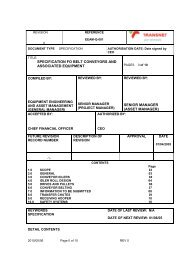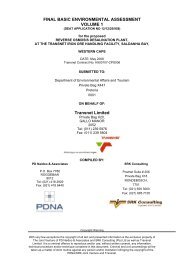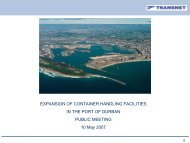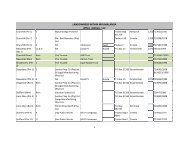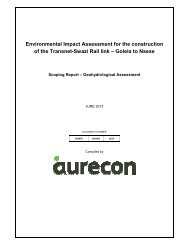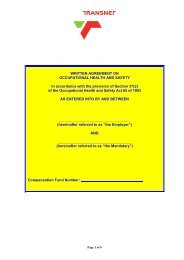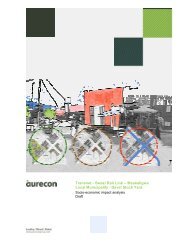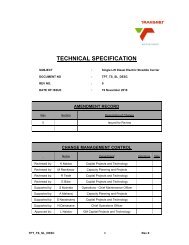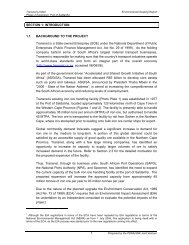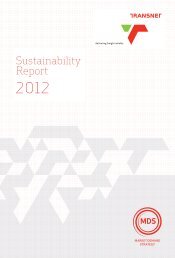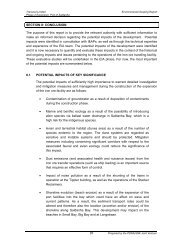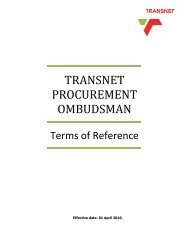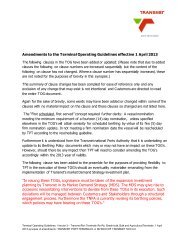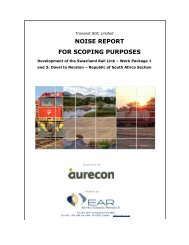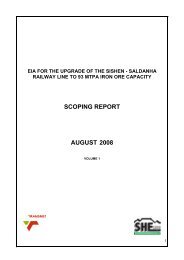Version1: Applicable from 1 April 2011 - Transnet
Version1: Applicable from 1 April 2011 - Transnet
Version1: Applicable from 1 April 2011 - Transnet
Create successful ePaper yourself
Turn your PDF publications into a flip-book with our unique Google optimized e-Paper software.
6.11. Abnormal Cargo<br />
6.11.1. Abnormal cargo is cargo which exceeds any one of the measurements below. Heavy<br />
operating skips are excluded and are classified as standard port operating<br />
equipment.<br />
6.11.1.1.1. Mass 30 tons (30 000 kilograms)<br />
6.11.1.1.2. Length 12 metres<br />
6.11.1.1.3. Width 2.5 metres<br />
6.11.1.1.4. Height 2.87 metres<br />
6.11.2. Cars, trucks, trailers and machinery on own wheels will only be dispatched or<br />
received in daylight.<br />
6.11.3. Abnormal cargo will not be staged on the quayside other than for pre-assembly and<br />
then at the sole discretion of TPT and will not be loaded onto rail wagons unless<br />
<strong>Transnet</strong> Freight Rail has especially agreed thereto in writing. Abnormal cargo is<br />
handled at the Customer’s risk and TPT accepts no liability for any loss or damage to<br />
any such cargo, howsoever arising. The Terminal Operator must approve the<br />
discharge of abnormal cargo onto a quayside or it being loaded onto an AMV and<br />
such approval is subject to arrangements have been made to the reasonable<br />
satisfaction of TPT for the handling and carriage of such abnormal cargo by the<br />
importer or exporter thereof.<br />
6.11.4. Abnormal cargo which is landed directly onto an AMV must leave the terminal cargo<br />
working area within four (4) hours of landing. Failure to do so will result in such<br />
abnormal cargo being treated as indirect cargo, notwithstanding such cargo<br />
remaining loaded on AMV trailers, and the Terminal Handling Charge (THC) for<br />
indirect loading as well as relevant storage charges will apply.<br />
6.11.5. Abnormal cargo handling must comply with the vessel and terminal’s safety<br />
standards as well as the conditions described in the Tariff Book. Exceptions to not<br />
handle any abnormal cargo at night will be tabled by the TM with reasons pertaining<br />
thereto. All necessary safety requirements must be signed off by all parties involved<br />
in the handling of abnormal cargo. This includes the riggers and experts for handling<br />
such cargo, the terminal safety officer and responsible supervisor.<br />
6.11.6. Any abnormal cargo planned for direct landing onto waiting AMV’s, which is then<br />
found to have been landed on the quayside, will be removed by the terminal using<br />
appropriate terminal equipment and staged away <strong>from</strong> the quayside by TPT. The<br />
cost incurred in doing so shall be for the vessels account or that of its<br />
representative. TPT shall not be liable for any loss or damage to such cargo<br />
howsoever arising.<br />
Terminal Operating Guidelines: Version 3 – <strong>Transnet</strong> Port Terminals Ro-Ro, Break-bulk, Bulk and Agricultural Terminals: 1 <strong>April</strong> 2013<br />
TRANSNET PORT TERMINALS, A DIVISION OF TRANSNET SOC Ltd 34



